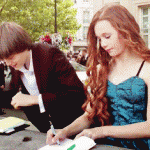By Keith Clarke
The 117th season of the Henry Wood Promenade Concerts gets underway tomorrow with Jiří Bĕlohlávek conducting the BBC Singers, Chorus and Symphony Orchestra in the world premiere of a BBC-commissioned work by Judith Weir, a Brahms overture, Liszt’s second piano concerto with the Proms’ youngest ever soloist—19-year-old Benjamin Grosvenor—and Janáček’s Glagolitic Mass.
The first night of the Proms is always a hot ticket, and one that the BBC is kindly proffering in my direction, so I had better line up my excuses for absenting myself from the Royal Albert Hall. Can I ever hold my head up in cultured society if I admit that I’m going to Harry Potter and the Deathly Hallows—Part Two instead?
Is this old music hack finally losing his marbles? Not entirely. Truth to tell, my 14-year-old son is playing the part of the Young Snape in this final outing for Harry Potter and chums, and since I haven’t been able to get into any of the preview screenings for the cast (good boy—he took his sister instead), wild horses will not stop me seeing my boy on screen come the official opening night.
Strangely, he won’t be with me, Warner Bros having flown him to Florida for the week to take part in a massive Harry Potter fan convention and to try out the spooky rides at the HP theme park. At last week’s London premiere, as I watched a live stream of him signing autographs in London’s Trafalgar Square, I couldn’t help thinking that a few nights’ camping in a wet field in Cornwall would no longer cut the mustard as a vacation excitement.
Young Snape signs autographs at the premiere with co-star Ellie Dalden (Click for animation)
>>>
It is a brave thing to commit “Jiří Bĕlohlávek” to cyberspace in the hope that it comes out with a full set of accents, and we’re all displaying the same amount of courage in welcoming the arrival of Danish conductor Thomas Søndergård as principal conductor designate of the BBC National Orchestra of Wales.
While we still live in fear that it will all come out looking like gobbledygook, getting computers to trade in left-field character sets used to be a whole lot more difficult. Microsoft ruled the world of software, but it had a bland disregard for the fact that much of its market indulged in a whole range of wild and wacky accents. In the early days of computerized typesetting, we sometimes had to resort to adding the more obscure accents to the artwork by hand, which was a precarious process, especially after a few drinks.
In 1987, when Libor Pešek was made music director of the Royal Philharmonic Orchestra, I found myself sitting next to him at an awards dinner, and said that while I welcomed his appointment, in some respects it was a complete pain in the butt, since one of the many things Bill Gates & Co did not offer at that time was a letter “s” sporting a háček. The maestro considered this at some length before replying: “Mr Clarke, I admire your sense of humor.”
